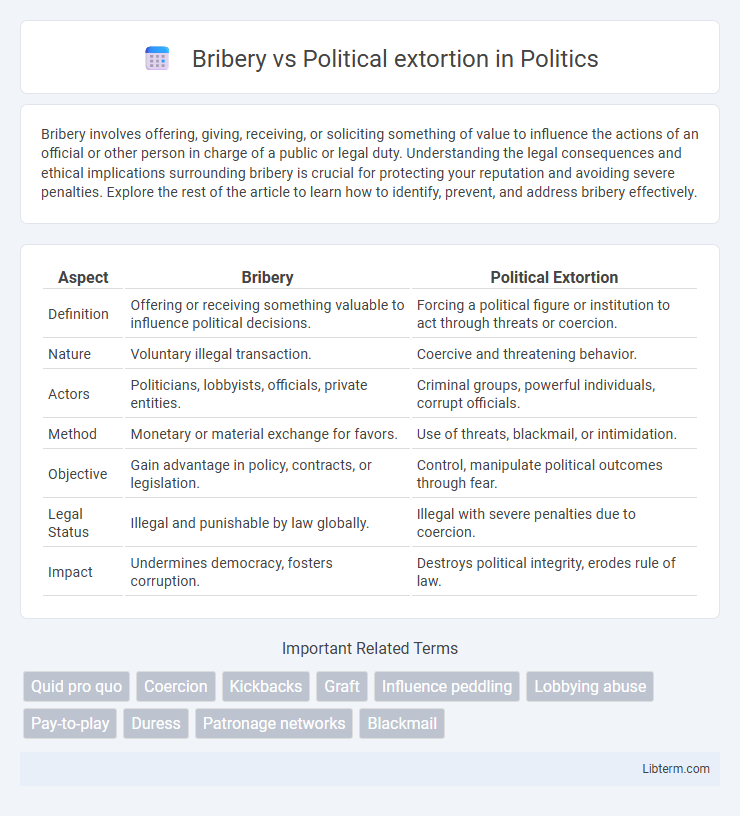Bribery involves offering, giving, receiving, or soliciting something of value to influence the actions of an official or other person in charge of a public or legal duty. Understanding the legal consequences and ethical implications surrounding bribery is crucial for protecting your reputation and avoiding severe penalties. Explore the rest of the article to learn how to identify, prevent, and address bribery effectively.
Table of Comparison
| Aspect | Bribery | Political Extortion |
|---|---|---|
| Definition | Offering or receiving something valuable to influence political decisions. | Forcing a political figure or institution to act through threats or coercion. |
| Nature | Voluntary illegal transaction. | Coercive and threatening behavior. |
| Actors | Politicians, lobbyists, officials, private entities. | Criminal groups, powerful individuals, corrupt officials. |
| Method | Monetary or material exchange for favors. | Use of threats, blackmail, or intimidation. |
| Objective | Gain advantage in policy, contracts, or legislation. | Control, manipulate political outcomes through fear. |
| Legal Status | Illegal and punishable by law globally. | Illegal with severe penalties due to coercion. |
| Impact | Undermines democracy, fosters corruption. | Destroys political integrity, erodes rule of law. |
Introduction to Bribery and Political Extortion
Bribery involves offering, giving, receiving, or soliciting something of value to influence the actions of a public official or other authority in a corrupt manner. Political extortion occurs when a public official demands money, favors, or services under threat of harm or negative consequences to coerce compliance. Understanding the distinctions between these forms of corruption is essential for legal frameworks and anti-corruption policies aimed at promoting transparency and accountability.
Defining Bribery: Key Elements and Terminology
Bribery involves offering, giving, receiving, or soliciting something of value to influence the actions of an official or other person in a position of power, often to secure unfair advantages. Key elements include the quid pro quo arrangement, where a benefit is exchanged for a specific action or decision, and the corrupt intent underpinning the transaction. Terminology associated with bribery includes "payoff," "kickback," and "graft," all highlighting illicit financial incentives used to manipulate political or business outcomes.
What Constitutes Political Extortion?
Political extortion involves the coercion of public officials or entities to obtain money, favors, or influence by threatening harm, exposure, or other adverse consequences. It differs from bribery, where an individual voluntarily offers payment or benefits to influence decisions. The key element in political extortion is the use of intimidation or threats to force compliance, undermining lawful governance and democratic processes.
Legal Distinctions Between Bribery and Political Extortion
Bribery involves offering, giving, receiving, or soliciting something of value to influence an official act, while political extortion entails coercing a public official to obtain money, property, or services through threats or misuse of power. Legally, bribery requires a quid pro quo arrangement, demonstrating intent to corruptly influence a public official's decision or action. Political extortion is characterized by the unlawful use of force or threats to compel government officials into granting benefits against their will, making it distinct in evidentiary requirements and criminal statutes.
Historical Cases: Bribery vs Political Extortion
Historical cases of bribery often involve officials accepting money or gifts in exchange for favorable decisions, as seen in the Teapot Dome scandal of the 1920s, where government officials were bribed for oil leases. Political extortion cases, such as the Watergate scandal, typically revolve around coercion and abuse of power to extract benefits or suppress opposition. These events highlight distinct legal and ethical breaches, with bribery centered on illicit exchange and extortion focused on threats or pressure to gain political advantage.
Motivations Behind Bribery and Political Extortion
Bribery is primarily motivated by the desire to gain undue advantages, such as favorable contracts or regulatory leniency, by offering illicit payments to officials, whereas political extortion involves coercing individuals or entities to provide money or support under threat of harm or exposure. The core incentive behind bribery lies in exploiting opportunities for personal or corporate gain through secretive transactions, while political extortion thrives on leveraging power and intimidation to enforce compliance. Both practices undermine governance, but their motivations differ in the use of either inducements or threats to achieve illicit objectives.
Impact on Governance and Democratic Institutions
Bribery undermines governance by enabling corruption, weakening institutional integrity, and distorting public policy through illicit financial influence. Political extortion damages democratic institutions by coercing officials, eroding public trust, and fostering an environment of fear and manipulation that stifles transparency and accountability. Both practices compromise the rule of law, hinder equitable resource allocation, and threaten the legitimacy of democratic processes.
Detection, Prevention, and Enforcement Strategies
Detection of bribery and political extortion relies on advanced data analytics, whistleblower reports, and financial audits to identify irregular transactions and corrupt behavior. Prevention strategies include stringent transparency laws, mandatory disclosures, and robust internal controls within political institutions to limit opportunities for illicit influence. Enforcement involves coordinated efforts between anti-corruption agencies, law enforcement, and judicial systems to investigate, prosecute, and sanction individuals engaged in bribery or political extortion.
Global Perspectives: Practices Across Different Countries
Bribery and political extortion manifest differently across global regions, reflecting diverse legal frameworks and cultural norms. In countries like Nigeria and Mexico, political extortion often intertwines with organized crime, whereas in Scandinavia and Japan, stringent anti-corruption laws curb bribery through transparent governance and rigorous enforcement. Comparative studies reveal that effective anti-corruption strategies depend on tailored policies addressing local socio-political dynamics and institutional integrity.
Combating Corruption: Policy Recommendations and Reforms
Combating corruption requires distinct policy recommendations addressing bribery and political extortion by enhancing transparency, enforcing strict legal penalties, and implementing comprehensive whistleblower protections. Reforms should focus on auditing political financing, establishing independent oversight bodies, and promoting civic education to reduce opportunities for illicit financial exchanges and coercion. Strengthening international cooperation and adopting technology-driven monitoring systems can further mitigate corruption risks in political processes.
Bribery Infographic

 libterm.com
libterm.com